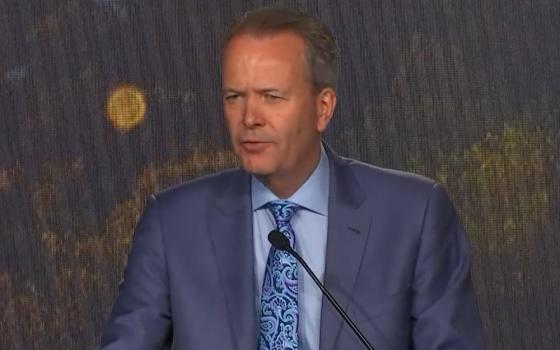We tend to hear Isaiah's prediction of the birth of "Emmanuel" as a wondrous announcement, the astounding prediction of a birth to take place 700 years after it was spoken. Indeed, it is a marvelous quote, but in its original context, it had nothing at all to do with Jesus. In reality, the birth announcement was made as a serious warning to a wicked king. Facing the danger of an invasion, King Ahaz had chosen to rely on the military might of Assyria to protect him, and in the process, he abandoned his fidelity to the God of his ancestors. Ahaz "piously" refused to ask for a sign because he did not want confirmation that Isaiah was speaking for God -- a backhanded affirmation that he did believe, but refused to heed, the prophet's words. Ahaz understood as clearly as Herod would later that the coming of "Emmanuel," the active presence of God, could be very bad news. It was true then, and remains so for anyone who chooses coercive power or material security over trust and fidelity to God.

| Fourth Sunday of Advent |
|
Isaiah 7:10-14 Psalm 24 Romans 1:1-7 Matthew 1:18-24 |
We hear the reading from Isaiah because Matthew chose it as the first of his prophecy-fulfillment statements about Jesus. It is also an invitation to reconsider our own anticipation of Emmanuel, God with us.
What does the advent of Emmanuel imply? Paul will answer with typically counterintuitive statements. Our reading from the beginning of the Letter to the Romans fits the season by naming Jesus as Christ, descended from David and established as Son of God through the Spirit. For Paul, that creed has very personal consequences. As a result of his faith, Paul identifies himself as a "slave of Christ." Ironically, that identification gives him radical freedom. He is free from the Law, free from living up to anyone's expectations, free to be "set apart" so that his life will have but one goal. For Paul, faith in Christ engendered the freedom to obey God and God alone, and to offer that same freedom to everyone in the world.
When we come to the Gospel, Matthew recounts the real-life scandal and the potentially tragic dimensions of Emmanuel's advent. Joseph plays the central role here, and he is the opposite of his ancestor Ahaz. When Joseph confronted what had to be interpreted as unexpected and bad news, he did what any prudent person does: He slept on it before coming to a decision. That may be a key to understanding his character; a less humble, less self-confident man would have made a priority of protecting his reputation. Whereas Ahaz opted for salvation through military might, Joseph, like his father Abraham, entertained an angel and discovered an alternative. Joseph accepted the risk of faith. He took to heart the angel's primary message: "Do not be afraid."
Where does this lead us today? What do our readings tell us about Emmanuel and our anticipation of his presence? Isaiah reminds us that the coming of Emmanuel will expose our deepest motivations and priorities. In reality, like Ahaz, we will expose ourselves by the type of power we put our faith in and the signs we choose to believe in. It is up to us whether or not Emmanuel's coming is good news for us.
When we listen to Paul, we understand that Emmanuel offers us the chance to claim our own deepest identity. If we so choose, everything that we are and do will revolve around Christ. In that, we will know a new freedom. No one else will be able to define or circumscribe us because we will live with the power of the grace of the risen Christ, who has conquered all things.
Finally, Matthew offers us the model of Joseph as one whose faith made him unafraid. Would it be any wonder if, as he slept on his decision, he asked God for a sign about what to do? Whether or not he begged for a sign, Joseph risked everything on his faith in God's quiet messages to him. Joseph welcomed Emmanuel and claimed him as his own.
Now, as we end our Advent season, we are invited to look to the deeper meaning of our pretty Christmas scenes and question ourselves. Do we want to be open to new signs of God's presence? Are we willing to center our entire lives on Christ and to live in the freedom he offers us? Will we, with Joseph, risk the adventure of faith in spite of its unexpectedness and insecurity? If we can offer God even a hesitating "Yes" to those questions, the coming and the presence of Emmanuel will be good news for us. He did come and has promised to remain.
[Mary M. McGlone is a Sister of St. Joseph of Carondelet. She is a freelance writer and executive director of FUVIRESE USA, a charitable foundation that supports work with people with disabilities in Ecuador.]



